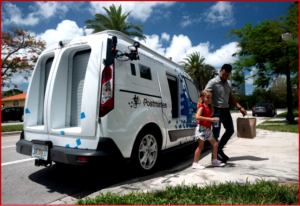
The research concentrates on the first and last mile of food delivery as Ford – like all other automakers – is working on self-driving technology in separate test vehicles.
In Ford Motor’s latest engineering-by press-release designed to bolster its sagging stock price, the Dearborn based automaker is working with Postmates, an on-demand delivery platform. It’s claimed the two will operate a self-driving delivery service. Research vehicles for the business pilots appear as self-driving, however, they are manually driven by an experienced driver.
Ultimately, Ford says it is testing how businesses and consumers interact with a self-driving vehicle.
The Postmates pilot now underway in Miami and Miami Beach has more than 70 businesses participating, including local fast-food pusher Coyo Taco. For residents in the area, when they order tacos , or something else from Postmates, they may be given the option to have it delivered by a self-driving like research vehicle.
When a meal is ready to be delivered, a restaurant employee will place it in the vehicle, likely a Transit Connect with a locker system to secure food and allow delivery to multiple customers on one delivery route. Services such as Postmates deliver an assortment of products (some that are edible or semi-edible) from sushi restaurants to hardware stores. Therefore, the rear and passenger-side lockers are different sizes.
One Ford Transit Connect self-driving research vehicle has three lockers — one on the passenger side and two in the back — that can deliver both food and goods. After the restaurant employee types his access code into the screen, one of the lockers will automatically open so that he can place the food inside. Each locker has two cup holders.
When the vehicle arrives at its destination, the customer receives a text notification indicating the delivery is ready for pickup. Upon meeting the vehicle at the curb, consumers enter an access code into the touch screen and the appropriate locker opens. Audio prompts direct the interaction and lights illuminate the designated locker.
Surprisingly, this is Ford’s first self-driving research vehicle modified specifically to test a variety of interfaces — the touch screen, the locker system, the external audio system— to inform the design of a Ford purpose-built self-driving vehicle that’s scheduled to arrive in 2021.
Thus far no indigestion reported.

